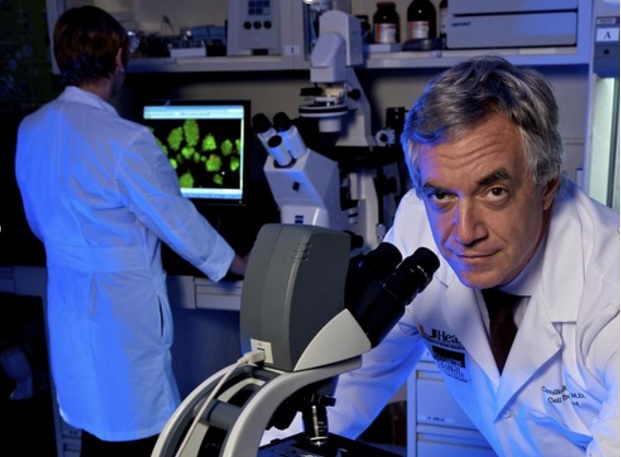This double-blind study followed 24 COVID-19 patients hospitalized in Miami, who developed severe acute respiratory distress syndrome, and who received 2 infusions of 100 million stem cells 3 days apart vs. placebo.
–
200 million stem cells to quell the cytokine storm
The researchers show, in this small group of patients, that the treatment is safe, without serious side effects related to the infusion but also extraordinarily effective:
- survival of infused patients at 1 month reached 91% vs. 42% in the control group;
- among patients under 85 years of age, 100% of those treated with mesenchymal stem cells survived at least 1 month;
- the recovery time is much faster in treated patients: more than half of the patients treated with mesenchymal stem cell infusions recovered and were discharged from the hospital within 2 weeks of the 2nd infusion;
- more than 80% of the participants in the treatment group recovered by day 30, vs less than 37% in the control group.
1 single cord, 10,000 patients! Umbilical cord blood is recognized as a unique source of cells Mesenchymal strains that can be developed to provide therapeutic doses to over 10,000 patients (from a single umbilical cord). “It is a unique resource of cells under study for cell therapy applications aimed at modulating the immune response or the inflammatory response”Says lead author Dr. Camillo Ricordi (on visual) director of the Cell Transplant Center at the Miami Miller School of Medicine: “We have been studying them with our collaborators in China for more than 10 years in type 1 diabetes, and there are currently over 260 clinical studies listed for the treatment of other autoimmune diseases.”
Mesenchymal stem cells help restore a normal immune response: Mesenchymal cells not only help correct uncontrollable immune and inflammatory responses but also exert antimicrobial activity. Finally, they promote tissue regeneration / repair. In addition, when administered intravenously, mesenchymal stem cells naturally migrate to the lungs. This is where treatment is most needed in COVID-19 patients with acute respiratory distress syndrome.
The findings are of crucial importance not only for COVID-19 but also for other diseases characterized by aberrant and hyper-inflammatory immune responses, such as type 1 autoimmune diabetes.
Thus, infusions of cord blood stem cells appear to be a promising and revolutionary treatment option for severe COVID-19. And an intravenous (IV) infusion, such as a blood transfusion, can restore the normal immune response and reverse the life-threatening complications associated with the cytokine storm characteristic of the severe form.
The next step will therefore consist of studying the use of stem cells in patients with COVID-19 who are not yet seriously ill but who may need to be intubated, in order to determine whether the infusions will prevent the progression of the disease . Next, the team plans to identify the implications for the treatment of other diseases: The hyperimmune and hyper-inflammatory responses of some autoimmune diseases could share a common thread with severe forms of COVID-19.
“Autoimmunity is a big challenge for healthcare, just like COVID-19. Autoimmunity affects 20% of the general population and includes more than 100 diseases, including type 1 diabetes “.
–


